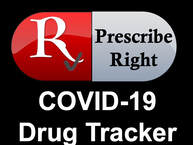|
COVID-19 Vaccines
The WHO released simplified names for COVID-19 variants of interest and concern to make it easier to report and talk about these virus mutations in non-scientific reports and articles. The simplified labels use Greek letters to identify a variant. The CDC has added these new designations to its tables of variant classifications and definitions. The WHO lists both the new simple names along with scientific names on its variant tracking page. The current list of variants being tracked by the CDC and WHO include (Pango lineage designation, Region first detected, WHO label):
Researchers from Johnson & Johnson and academia evaluated the efficacy of antibodies from 25 participants in a Phase I/IIa trial of J&J’s Ad26.COV2-S COVID-19 vaccine (NCT04436276) to neutralize COVID-19 variants. While there were decreased neutralization activity, functional activity was maintained for the Alpha variant, Gamma variant and Beta variant. A preliminary FDA review found reported cases of myocarditis/pericarditis have been consistent with the Pfizer-BioNTech COVID-19 vaccine clinical trials. The reported cases were greater than expected in patients 16 to 24. After the second dose, the incidence is estimated to be 16 cases per million doses. At least 81% of affected patients fully recovered. The FDA extended the shelf life of the Johnson & Johnson COVID-19 vaccine from 3-months to 4.5 months at refrigeration temperature (2-8 C). Researchers in Scotland examined COVID-19 cases and found the Delta variant as the dominant variant in the country. The researchers estimated the effectiveness of the Pfizer-BioNTech COVID-19 vaccine to be 92% for the Alpha variant and 73% for the Delta variant. The Astra Zeneca COVID-19 vaccine was 73% effective for the Alpha variant and 60% effective for the Delta variant. A pre-publication draft of a similar study in England found the effectiveness of the Pfizer-BioNTech to be 95% for the Alpha variant and 96% for the Delta variant with the AZ vaccine being 86% effective for the Alpha variant and 92% effective for the Delta variant. In a 30 patient case series from Johns Hopkins, researchers examined the effect of a third mRNA COVID-19 vaccine dose on transplant patients. Antibody levels were measured before the third dose and most patients had negative antibody levels with six having low levels. The booster dose was given 67 days after the second vaccine dose. Half of the patients received the J&J vaccine, while the rest received one of the mRNA vaccines. All six low antibody level patients developed high antibody titers. In the 24-patient, negative antibody level group, 25% developed high titers, 8% developed low titers and 67% remained negative. COVID-19 Antibodies NIH recommends that either Casirivimab plus Imdevimab (Regeneron), Bamlanivimab plus Etesevimab (Lilly) or Sotrovimab (Vir) be used for the treatment of outpatients with mild to moderate COVID-19 who are at high risk of clinical progression. NIH recommends against the use of Bamlanivimab alone, due to resistance from variants, unless the combination products are not available. Use of Bamlanivimab plus Etesevimab may be restricted in areas with high prevalence of the Beta and Gamma variants. NIH also recommends against the use of any monoclonal antibodies in hospitalized patients unless they are part of a clinical trial. Celltrion announced that in a 28-day, 1,315 patient, Phase III trial (NCT04602000), 3.1% of patients treated with regdanvimab were hospitalized or died compared to 11.1% with placebo in patients with mild-to-moderate COVID-19 at high risk of progressing to severe disease. High risk patients recovered in 9.3 days compared to 14 days with placebo. Astra Zeneca announced that in the 30-day, 1,121 patient, Phase III STORM CHASER trial (NCT04625972), 3% of patients (23/749) treated with the AZ COVID-19 monoclonal antibody combination, AZD7442 developed symptomatic COVID-19, a non-significant difference compared to 4.6% of patients (17/372) treated with placebo in healthy patients exposed to a patient with COVID-19. COVID-19 Anti-inflammatories In a pre-publication draft of the 28-day, 520 patient, Phase III, LIVE-AIR trial (NCT04351152), treatment with Humanigen’s lenzilumab improved ventilator-free survival by 54% in the mITT population and by 90% in the ITT population compared to placebo in hospitalized hypoxic COVID-19 patients not requiring invasive mechanical ventilation. In the trial, 93.7% of patients received a corticosteroid, 72.4% received remdesivir, and 69.1% received both. Ventilator-free survival was improved by 92% in patients where lenzilumab was added to both corticosteroids and remdesivir. Humanigen requested an Emergency Use Authorization (EUA) for lenzilumab for the treatment of patients hospitalized with COVID-19, based on results from the LIVE-AIR trial Comments are closed.
|
Stay informed, subscribe to the Prescribe Right Pharmaceutical Pipeline Tracker
Archives
January 2023
Categories |
Services |
Company |
Support |
© COPYRIGHT 2015. ALL RIGHTS RESERVED.
|


 RSS Feed
RSS Feed